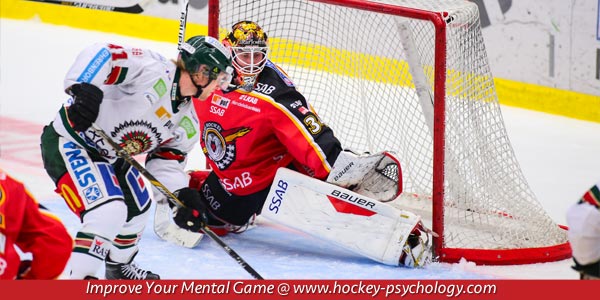Taking Practice Confidence to Games in Hockey
Have you ever failed to execute your skills in competition that you have repeated over and over successfully in practice?
What makes an athlete unable to perform simple tasks in competition that they have repeatedly performed for years in practice?
Over-thinking is one culprit that interferes with an athlete’s ability to perform in games as well as in practice. As an athlete begins to think about how to perform certain skills while competing, he disrupts the fluidity of movement, making basic habits difficult to perform.
Troy Brouwer, 28 year-old right winger for the Washington Capitals, has experienced a difficult 2013 season.
Brouwer signed a three-year contract extension in 2012 with an annual salary of 2.35 million per year but has not performed up to expectations. Through the first 28 games of this season, Brouwer recorded only five goals and 4 assists. At one point, Brouwer scored only one goal over a 15 game span.
Brouwer feels he has been over-thinking this season which has affected his performance and confidence, “There are certain aspects of my game that I’m not happy with… puck control in the corners and being able to make an outlet pass — something you should be able to do when you’re a little kid — but for some reason I’m having a little trouble with it. [I’m] just out there trying to get a little bit better, trying to improve my game and just get more confidence.”
Adam Oates, head coach of the Capitals, recognizes how a player can be adversely affected when he over-thinks and tries to do too much.
Oates wants Brouwer to focus on his overall game rather than his offensive statistics, “I talked to him about a week ago [and told him] that ‘You’re vital to us. Numbers are irrelevant… You’re a top-six forward, versatile, and like I’ve always said, I don’t care about numbers. Just play.’”
It is Important for a Player to Quickly Get into the Flow of the Game
Changes to routines and personnel can take a player out of his comfort zone and cause him to over-think and try to make things happen.
Brouwer has struggled to find his rhythm this season. Brouwer has played with rotating linemates throughout the year which changes his role from one game to the next.
Though Brouwer offers no excuses, the lack of continuity with his line has affected his play, “You always have to change your game. You always have to evolve, depending on who you’re playing with. [The team needs] a little bit different role for me this year, and I’ve got to get better at what my linemates need me to do.”
There are many reasons an athlete may over-think in competition, such as trying to do much, being nervous, attempting new skills, correcting previous mistakes, focusing on personal statistics and feeling uncomfortable in his role on the team.
To overcome the problem of over-thinking in competitions, you must uncover the reason for over-thinking.
There are Several Things you can do to “Play your Game”:
- You should recognize your strengths/ role on the team and play accordingly.
- You need to over-learn new skills through repetition in practice. Games are for playing or reacting, not thinking.
- You must let go of previous plays or mistakes and focus on the present play.
- You should learn how to let go of the practice mindset and instead perform to play great today.
Remember, your level of play is your responsibility. The choices you make will reveal themselves in your performance.
Check Out Our Hockey Mental Game Programs
Related Articles on Hockey Mental Game:
- Mental Keys to Recovery for Hockey Players
- How Hockey Players Grow into Their Potential
- Overcoming Mistakes in Hockey
*Subscribe to The Sports Psychology Podcast on iTunes
*Subscribe to The Sports Psychology Podcast on Spotify
Mental Coaching Programs for Hockey
Our mental game coaching programs for hockey players helps athletes improve confidence, concentration, let go of errors quickly, and stay composed during crunch-time. Read more about sports psychology for hockey players at Peaksports.com
Please contact me by phone at 888-742-7225 or by filling out the webform below to learn more about our personal mental training programs for hockey players or teams:

Leave a Reply